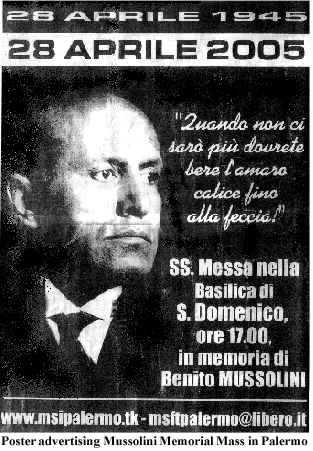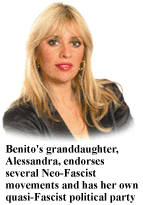...Best of Sicily presents... Best of Sicily Magazine. ... Dedicated to Sicilian art, culture, history, people, places and all things Sicilian. |
by Roberto Paglia | ||
Magazine Index Best of Sicily Arts & Culture Fashion Food & Wine History & Society About Us Travel Faqs Contact Map of Sicily |
Neo-Fascists? They're an eccentric group, to be sure, representing perhaps less than one percent of Sicily's population, but their ideas reflect a widespread Italian ignorance about Italy's Fascist past --a piece of history that older Italians (and their large "diaspora" of descendants in places like the United Kingdom, Argentina, Canada, Australia and the United States) would prefer to forget, or at least "revise" in the public mind by painting Italy as a "victim." Sadly, the New Fascism rears its ugly head every once in a while, supported by young people who don't know better and a few older citizens who should. Fascism was a terrible movement which hurt a lot of innocent people and brought the Second World War to Italy's doorstep, beginning with Sicily. The revival finds favour with several movements, a few minor political parties and the extremist fringe of the center-right National Alliance. In the spiritual sphere, the Neo-Fascists are usually Roman Catholic and intolerant of the presence of Protestants, Evangelicals and Orthodox (and non-Christians such as Muslims and Jews) in "Catholic Italy." This hardly reflects directly on the Catholic Church per se, though in Italy its stand against historical Fascism (in the 1930s and 1940s) was rarely very vocal; Italy has no official state religion today. However inappropriate or misdirected one considers the actions of a few priests, the Catholic Church is not the real culprit. As an institution, the Roman Catholic Church in Italy does not support Neo-Fascism. The roots of the problem may be found in the fact that Italy's schools and media have always given mixed signals --if any-- regarding Fascism and the war that Italy lost. Such ambivalence often breeds misunderstanding. Apart from broad political and social consequences, the effects of Mussolini's war were terrible and in some cases bizarre. Old King Vittorio Emanuele III changed sides in September 1943 following the Allied conquest of Sicily and the removal of Mussolini as Prime Minister, but the Soviet Union did not release its last German and Italian prisoners of war until 1955. Italy became the first nation to acknowledge having committed crimes against humanity (in the Ethiopian campaign). In northern Italy after 1943, partisans who had agreed to collaborate with the advancing Allied forces often took the law into their own hands, even murdering priests and other civilians. From 1946, the king's descendants were exiled for a half-century and only allowed to re-enter Italy a few years ago. Despite national holidays celebrating Italy's liberation and the referendum establishing the Italian Republic, the topics of Fascism and the Second World War were verboten or at least highly politicised (violently pitting conservatives against leftists). The whole complicated socio-political mess was something that most post-war Italians simply chose to avoid. And they failed to tell their children much about it. In Italian schools, history ends in 1920, though new curricula are finally beginning to extend it. In Sicily, more immediate social problems, like unemployment, poverty, illiteracy and organised crime, supplanted the collective assessment of Fascism. Only in the late 1990s were extensive studies published in Italy on the subject in the form of bestselling books, and documentaries aired on television. What is the agenda of the Neo-Fascists? It's primarily domestic rather than international, except for loose association with kindred movements in France, Austria and Germany. The favorable portrayal of Mr. Mussolini is, of course, important in their scheme. In practice, this means things like naming streets and squares in his honour, efforts thus far blocked in Sicily. Typically, Neo-Fascists also desire the expulsion of most foreigners from Italy. In Sicily, they want the United States Naval Air Station at Sigonella closed, even though it provides employment to thousands of Sicilians. (The presence of the Sigonella base also annoys extreme leftists, such as Communists.) Foreign trade and tourism are not openly discouraged but economic protectionism is preferred, and Italy's membership in the European Union is often questioned. Ideally, they would like to see more Italianist nationalism, with freedom of the press curtailed somewhat. Historical revisionism is encouraged; a clever strategy is to cite a few semi-successful social programs of historical Italian Fascism (pensions, public housing, the public school network, certain labour laws, domestic price controls) while ignoring fundamental human rights violations and atrocities in Italy and its ill-won foreign lands (places like Libya, Ethiopia, Albania and Greece). In the minds of Neo-Fascists, justifications abound, and being a "good" Italian means being a Fascist sympathiser. These aren't too different from some of old Benito's ideas in the 1930s, though today's lady Neo-Fascists wear shorter skirts than their older sisters of yore. (Well, in those days Italian women weren't even allowed to vote.) What's old is new. Observers are quick to note that some Neo-Fascist ideas are simply extreme reactions to the politically-correct leftism that has infiltrated Italian society, as well as other countries, in recent decades. As the actual "Fascist" party is outlawed by the Italian constitution, Neo-Fascists use new names to identify their organisations, things like "Tricolore" (referring to the Italian tricolour flag). "Forza Nuova" (New Force) is another Neo-Fascist "mini-party." The Neo-Fascists themselves usually act anonymously, rarely revealing their names. Of course, that's difficult when they run for political office. Benito Mussolini's granddaughter, Alessandra, is just one member of parliament
who embraces the bizarre movement. Her own views, The movement often draws inspiration from nostalgic older folks who were actually connected with historical Fascism in one way or another. The most prominent is Mirko Tremaglia, colourful and controversial Minister for Italians Abroad. Born in 1926, he defended Mussolini's Italian Social Republic (Salò) as a young man and later joined the MSI (democratic Italy's successor to the constitutionally outlawed Fascist party). The complexity here is that in 1945 Italy (like her allies Germany and Japan) found herself with literally millions of "patriots" morally compromised by participation in the misdeeds of a bad regime --everybody from generals responsible for war crimes in Ethiopia, Greece and Albania, to judges, mail censors and local Fascist bureaucrats. Even abroad, Fascist-oriented --or at least ultra-nationalist-- organisations, such as New York's Figli d'Italia or "Sons of Italy" (a name used redundantly by numerous unconnected groups) had flourished in the 1930s. Obviously, most of these people "normalised" their lives following the war. It is a war that Italians are reminded of once a year. Ironically, Neo-Fascists commemorate their hero just days after most Italians celebrate our nation's liberation by American and British forces. Benito Mussolini was killed by partisans on 28 April 1945, just days after the last Germans were pushed out of Italy and the last Fascists of the north defeated. Italian Liberation Day is observed on 25 April. Neo-Fascists oppose observance of Liberation Day. Though Fascist Italy was a monarchy, few Neo-Fascists are monarchists, instead preferring to identify with Mussolini's short-lived Italian Social Republic (a Nazi puppet state). While hardcore Neo-Fascists are a tiny minority of Italians, their revisionist views are advocated by a number of center-right politicians who would like to rewrite Italian history to portray the Fascists as misdirected but patriotic "boys." Such perspectives, overlooking the lessons taught by real history, could negatively influence public policy. The language of hatred is unpleasant, but is there really any reason to worry about a few social misfits? No, at least not until they begin to substitute (in public institutions) their misinformation for accurate information regarding the historical Fascist movement which influenced Italian life from 1922 until 1945, in the process nearly destroying our country. Unfortunately, while the Nazi movement has never been forgotten, either in Germany or elsewhere, several generations of Italians have been raised with little or no knowledge of Fascism, and such a void opens the door to opportunistic political movements such as Neo-Fascism. Nowadays, it seems that every country has its eccentric right wing, but in Italy and Germany the eccentrics have the advantage of tangible, if defeated, historical models, namely Mussolini and Hitler. Ideas can be harmful, though for now the Neo-Fascists are more dangerous to themselves than to anybody else. Keep them in your prayers. About the Author: Roberto Paglia has written several articles for this publication relating to social topics. | |
Top of Page |
 Prayers for a deceased dictator? As a teenage seminarian in Bavaria,
Joseph Ratzinger, the future Pope Benedict XVI, was coerced into joining
the Hitler Youth, an experience that made him a lifelong anti-Nazi --and
equally anti-Fascist. In such an age, how is it possible that a Catholic
priest at one of the largest churches in the Archdiocese of Palermo would
celebrate an annual mass for the fallen Italian dictator Benito Mussolini?
To save the dictator's soul, perhaps? In fact, the annual mass (formerly
celebrated at San Matteo on Corso Vittorio Emanuele and, more recently,
at the Basilica of San Domenico a few blocks away) is sponsored by Neo-Fascists.
Prayers for a deceased dictator? As a teenage seminarian in Bavaria,
Joseph Ratzinger, the future Pope Benedict XVI, was coerced into joining
the Hitler Youth, an experience that made him a lifelong anti-Nazi --and
equally anti-Fascist. In such an age, how is it possible that a Catholic
priest at one of the largest churches in the Archdiocese of Palermo would
celebrate an annual mass for the fallen Italian dictator Benito Mussolini?
To save the dictator's soul, perhaps? In fact, the annual mass (formerly
celebrated at San Matteo on Corso Vittorio Emanuele and, more recently,
at the Basilica of San Domenico a few blocks away) is sponsored by Neo-Fascists. however, are rarely as extremist as those of her more vocal supporters.
(Born in 1962, Alessandra never knew the "Duce.") Its "official"
membership may be small, but is Neo-Fascism's "implicit" following
a serious political force? More often than not, its apologists are simply misinformed or narrow-minded. Their interpretation of history is based on selective memory rather
than a balanced analysis of the facts, and Neo-Fascism's unwitting allies include
various revisionists. Clearly, not every Italian nationalist movement is
actually Neo-Fascist. Few Sicilians born after the second World War are racists, but many of the Neo-Fascists clearly are. Moreover, their opinions (ironically) ignore
however, are rarely as extremist as those of her more vocal supporters.
(Born in 1962, Alessandra never knew the "Duce.") Its "official"
membership may be small, but is Neo-Fascism's "implicit" following
a serious political force? More often than not, its apologists are simply misinformed or narrow-minded. Their interpretation of history is based on selective memory rather
than a balanced analysis of the facts, and Neo-Fascism's unwitting allies include
various revisionists. Clearly, not every Italian nationalist movement is
actually Neo-Fascist. Few Sicilians born after the second World War are racists, but many of the Neo-Fascists clearly are. Moreover, their opinions (ironically) ignore